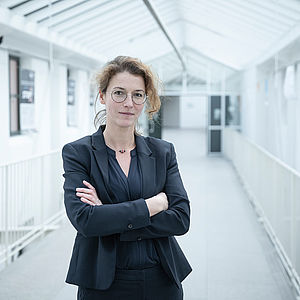“For me, Philosophy is a way of understanding our situation and locating ourselves within a constantly changing world. Hence, I am particularly interested in ethical questions raised by processes of social and political transformation, which call a new for a reflection on what is right and wrong.
It is important for me to bring pressing contemporary questions into a fruitful dialogue with the history of philosophy to develop viable solutions for the future. Methodically speaking, I do not separate studies of the history of philosophy from systematic questions but rather put them in a relation of constructive exchange. Digitalisation and migration are the main focal points of my research.
In terms of new technologies, algorithmic discrimination would be an example, namely, the question of how algorithms deal with human diversity. This begins right where data is collected. What part of the world do they depict? Which data is stored about whom under what circumstances and what are the results of algorithmic processing? In this context, we are repeatedly confronted by decisions that have an ethical dimension.
Concerning the ethics of migration, I examine which rights and duties migrants have when crossing a border and also which rights and duties states have in relation to them. In my PhD thesis, I developed a Kantian migration theory that considers both aspects based on Immanuel Kant’s reflections on migratory movements and cosmopolitan right.
Applied ethics has been established as a field because our everyday life became highly complex and many questions of enormous societal relevance arose in the past century that cannot be addressed properly without ethical reflection. Those questions need interdisciplinary exchange as well as a normative orientation. Ethics serves, here, as an important source for a substantiated dialogue.”
More about her research
Professor Reinhardt’s main research focus is on applied ethics in the field of algorithm ethics, the ethics of digitalisation and AI ethics as well as the ethics of migration. Furthermore, she has research interests in political philosophy and the philosophy of law.
Professor Reinhardt's Twitter profile.















![[Translate to English:] [Translate to English:]](https://www.digital.uni-passau.de/fileadmin/_processed_/3/5/csm_Nour_Shaban_fc4be1f6b2.png)
